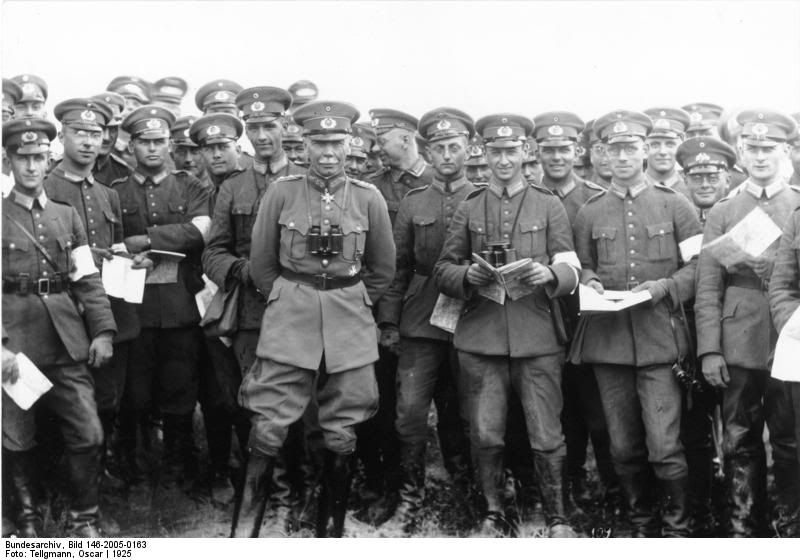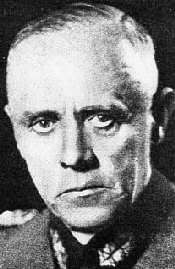The politics of an army
The legacy of Clausewitz
In his monumental book 'On War' Carl von Clausewitz described the close but separate roles of the civil government and the general staff in times of war. Since politics and military affairs are so closely related, Clausewitz recommended the presence of the Chief of Staff during cabinet meetings. Most scholars agree that Clausewitz meant for the Chief of Staff to be an observer during these meetings, as warfare was more than often a direct effect of political decisions. However, during the course of the 19th century, this maxim was changed to the Chief of Staff participating during cabinet meetings, breaking Clausewitz proposed separation of the realms of politics and warfare. As such the Chief of the General Staff is an influential participant in politics without having to answer to anyone but the Kaiser. The potential for misuse of the position was proven during the Weltkrieg, when Hindenburg, and through him Ludendorff managed to hijack control over the German state. After the fall of the Hindenburg/Ludendorff junta in 1924, the role of the Chief of the General Staff was reigned in, both by the appointment of August von Mackensen as Oberbefehlhaber des Heeres (Chief of the Army - a new function) and the mental decline of Hindenburg himself.
Hans von Seeckt among a cadre of young officers in training. Although his views on warfare where often criticized, none doubted Seeckt's ability to whip an army into shape.
After Hindenburgs death in 1934 the hero of the Chinese intervention, Generalmarschall Hans von Seeckt rules the Generalstab with an iron fist. Von Seeckt proved to be an able administrator, planner and organizer of man, but also a staunch conservative who was unable (or unwilling) to notice the changing of the times. He managed to pull the army out of the stagnation of the Hindenburg years, but failed to prepare Germany for a different kind of war than trench warfare. Doing so he ignored the lessons of the Chinese campaign he had led himself, where quick movement, infiltration tactics and gaining local superiority where possible proved key to destroying the massive Chinese armies. Several of Seeckt subordinates, Heinz Guderian chief among them, proved to be among Seeckts strongest opponents. Yet Seeckts tenure came to an end at the 27th of december 1936, when Hans von Seeckt died. The Generalstab was thrown into disarray, conservative, progressive and moderate officers alike trying to maneuver their preferred candidate into the vacant position. The news that old man Mackensen would retire within months did nothing to cool the heated heads.
Political warfare
The chaos even spread to the halls of the Reichskanzlei as Kanzler Von Papen and Secretary of the Interior Von Schleicherfavoured different candidates. Papen saw Seeckts demise as a change to finally break the armies grip on politics by appointing a candidate he could bind to his will, preferably the disgraced Marschall Von Blomberg. Kurt von Schleicher, a general staffer by trade, preferred his good friend Generaloberst Fedor von Bock, nicknamed the 'Holy Fire of Küstrin'. Since the final choice lay with Kaiser Wilhelm, both men tried their best to charm the emperor into appointing their favoured candidate. The struggle between the two most powerful politicians of the nation was short, but especially vicious. The rift it caused between both men would never fully heal.
In the end neither Papen nor Schleicher managed to get their favoured candidate appointed. The abysmal performance against the weak Lithuanians and the succes of maneuver in China had convinced both Crown Prince Wilhelm and Marschall von Mackensen, Weltkrieg veterans and highly influential, that change needed to come to the Generalstab. As a result a total outsider was appointed, namely Generaloberst Ludwig Beck. Beck had just recently returned to active service to lead a panzer development campagn, and was considered to be isolated in his ideas about maneuver warfare. Early february 1937 Ludwig Beck entered Charlottenburg Palace as a commoner and an outcast, but exited the palace as a nobleman and leader of Germanies forces. The tenure of Ludwig August Theodor Freiherr von Beck would be the most tumultuous in German history.
Ludwig von Beck (born Ludwig Beck). His surprise appointment shocked the German military establishment.
####################
Back into the fray with a short update about the German Generalstab. Expect a few more military updates after this one.
).


